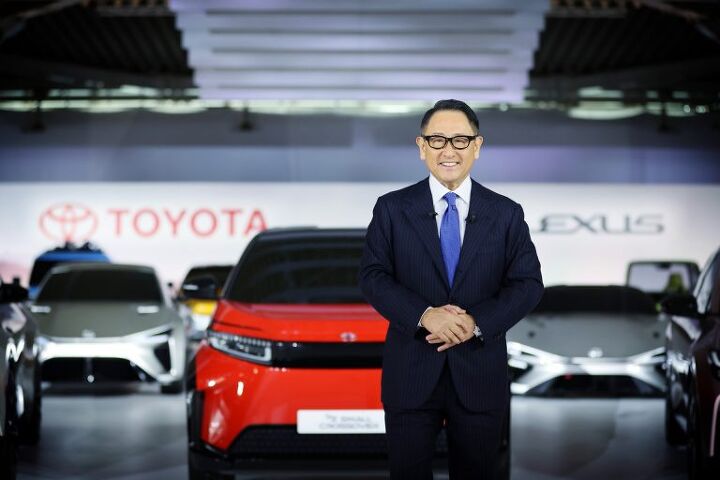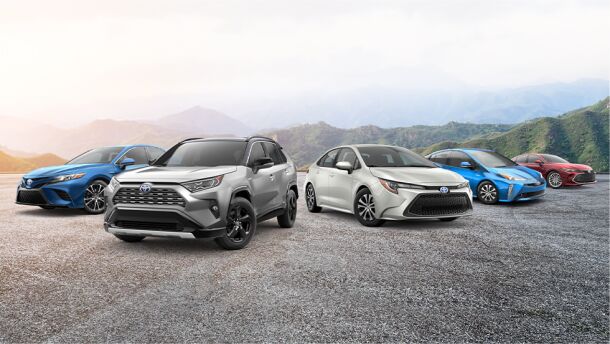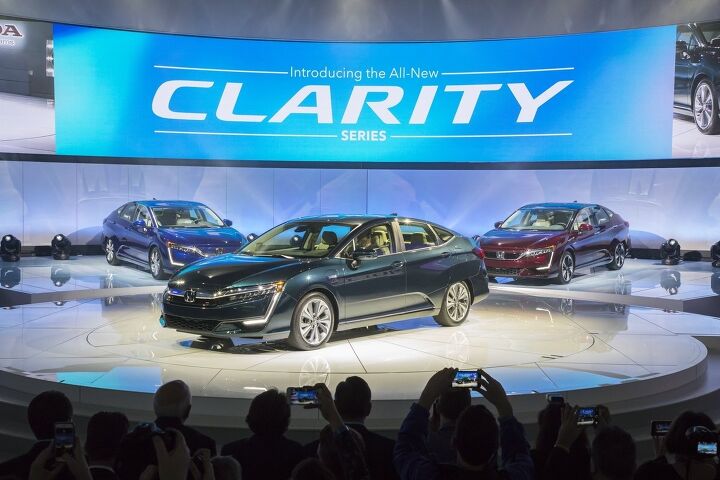#hevs
Honda Insight Being Replaced By More Hybrids Across Lineup
Ahead of Honda’s planned EVs offensive for the United States, the automaker has announced a deluge of hybrid variants of existing products. However these new vehicles will come at the expense of the Insight, which the company had just confirmed will be discontinued after 2022. In its stead will be new hybrid trips for the CR-V, Accord, and Civic — the latter of which served as the template for the passing model.
Toyota Announces EV Strategy, Readies $70 Billion for the Cause
On Tuesday, Toyota Motor Corp. announced a commitment of 8 trillion yen ($70 billion USD) toward the goal of achieving carbon neutrality someday. Though the concept of any multinational manufacturing entity totally nullifying their carbon footprint seems kind of laughable, so we’ll be referencing this as another electrification strategy — which is still a big deal considering how EV averse Toyota has been thus far.
Despite being an environmental trendsetter with the Prius Hybrid, Toyota has been hesitant to formally commit itself to transition its lineup toward being reliant on battery power. However, President Akio Toyoda has just proudly confirmed that the Japanese automaker would be earmarking the funds for exactly that purpose, noting that the brand (along with Lexus) would be spending the money through 2030 to make sure its global sales of battery electric vehicles (BEVs) reach 3.5 million vehicles annually. Though the most enjoyable aspect of the release was the direct manner it was presented, with Toyoda-san being impressively honest about modern automotive trends.
Toyota Financial Results for 2021 Revealed
Last week, Toyota financial results for the fiscal year that ended March 31st were announced. Vehicle sales totaled 7,646,000, a decrease of 1,309,000 units, or a little less than 15 percent compared to the previous fiscal year.
Net revenue was $256.7 billion, an 8.8 percent decrease. Operating income decreased from $22.6 billion to $20.7 billion, while income before taxes amounted to $27.6 billion. Net income was up from $19.2 billion to $21.1 billion.
Study Shows Nearly Nine in 10 Americans Want Better Fuel Economy, But There's a Problem
A recent study from Consumers Union — the public policy and advocacy division of Consumer Reports — shows continued interest among U.S. residents in seeing automakers improve fuel economy figures, even as gas prices remain fairly low.
While this should come as a shock to no one, nearly nine in 10 surveyed consumers agreed automakers should continue improving fuel efficiency standards on all vehicles. As well, only 30 percent believed manufacturers actually cared about lowering fuel costs for their customers.
This might be true but, then again, why would automakers do such a thing when the general populace has essentially turned its back on economical passenger cars? With little incentive to sell them, especially if the Trump administration alters 2025 emission targets, any top-tier automaker focusing exclusively on building MPG-focused automobiles would be placing itself at major financial risk.
The survey indicated fuel economy as the area perceived to possess the most room for improvement in modern vehicles. However, consumers have not used their wallets to bolster economy car sales. There appears to be a disparity between what the public claims to value and how it actually behaves. At a minimum, consumers may have misunderstood everything it would take to see fleet-wide fuel consumption decline. If they want to see higher MPGs, they’re going to have to make some sacrifices and the survey doesn’t allude to that fact.
Here's Why Japanese Automakers Keep Sending Hydrogen-powered Cars to North America
The United States and Canada don’t have much of a hydrogen fueling infrastructure to speak of, but Japanese automakers continue sending fuel cell vehicles across the ocean anyway. Vehicles like the Honda Clarity and Toyota Mirai have been touted as the environmental saviors of tomorrow but, with the exception of California, there really isn’t a place for them in the North America of today. So why do Japanese manufactures continue to bother with hydrogen?
The main reason is because Japan has bought into a future that America doesn’t seem interested in. With three of its automakers already producing fuel cell cars, the government as adopted a fairly aggressive plan to adopt hydrogen for homes, business, and cars by 2030 — meaning the U.S. probably won’t see these vehicles vanish anytime soon.
2017 NYIAS: Honda Builds the Clarity Into a Family
Honda primarily uses the Clarity to prove its faith in the future of hydrogen-powered vehicles, but it doesn’t sell very many of the fuel-cell equipped cars — and those that are on the road are limited to the California coast. As one of the few hydrogen offerings in North America, the Clarity has broadened its role to encompass any form of alternative fueling. Wednesday at the 2017 New York Auto Show, Honda shed more light on the hydrogen-free EV variant of the Clarity, as well as its new plug-in hybrid.
That ought to boost Clarity sales to previously unfathomable levels. Honda is setting a U.S. target of 75,000 units over the first four years, a quadrupling of the company’s current electrified vehicle output. However, that’s a drop in the bucket compared to its EV sales goal of two-thirds of all light vehicle deliveries by 2030.
Nissan Prepares to Rejoin the Competition With Next Wave of Electric Vehicles
Consumer demand may be the driving force behind automakers shifting assembly line production toward crossover vehicles, but there is another trend that has nothing to do with modern-day sales. Electric vehicles have a small but loyal consumer base and the majority of carmakers seem poised to ensure the next decade caters directly to them — whether it be through pure BEVs or hybridized powertrains.
However, not every manufacturer has its electrified ducks in a row. Despite hitting its mark with the Leaf EV, Nissan has been resting on its laurels since 2010 and hasn’t made the same sort of technological promises that Volkswagen Group or Ford cannot help but keep repeating… over and over again. Nissan’s chief planning officer Philippe Klein even admitted in January that his company’s EV prospects are dim and something needs to be done.
2017 Hyundai Ioniq First Drive Review - Alternatively Conventional, Sublimely Sufficient
At 30,000 feet above Nebraska, a man who could generously be described as severely corpulent had finally reached the level of personal solace required to allow his mass to spill out of seat 27D and into my own. It was another 1,500 miles to New York, and I could already feel the damp warmth of his body begin to encompass my left side as his sweat began seeping through his pants’ cotton-nylon blend and into my dark denim. Hyundai had invited me out for the introductory press event for its new hybrid/EV five-door, the Ioniq, and I desperately wished I was back in California braving unseasonably heavy rains on low rolling resistance tires as some overfed stranger’s lap oozed across my thigh.
I would have given practically anything to be back behind the wheel of one of Hyundai’s demo cars — not because the Ioniq was the pinnacle of automotive excellence, but because, a day earlier, the company claimed the hybrid version could make the entire transcontinental journey for roughly $100. I’d have gladly paid the Benjamin and spent four headache-free days on the road to avoid four of the most emotionally traumatic hours of my life.
While saying that Hyundai’s new green machines are little more than a preferable alternative to being smothered by middle-aged flesh isn’t the highest praise, I can also say that the Ioniq Electric, Hybrid, and Plug-in Hybrid are all superlatively serviceable — surpassing expectations without ever becoming a sensation. This is adequacy at its most acceptable.























Recent Comments